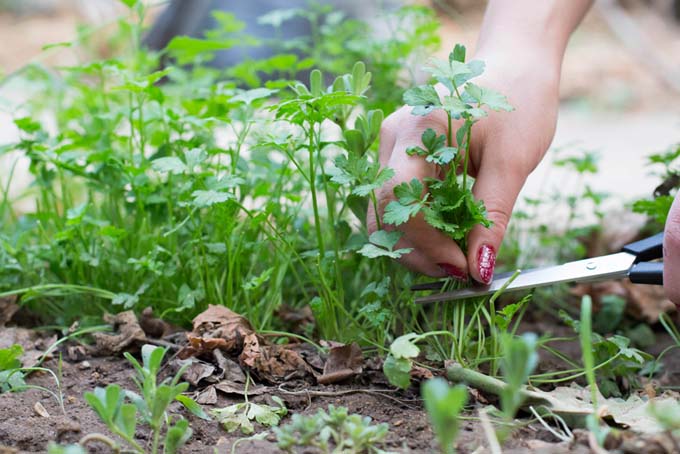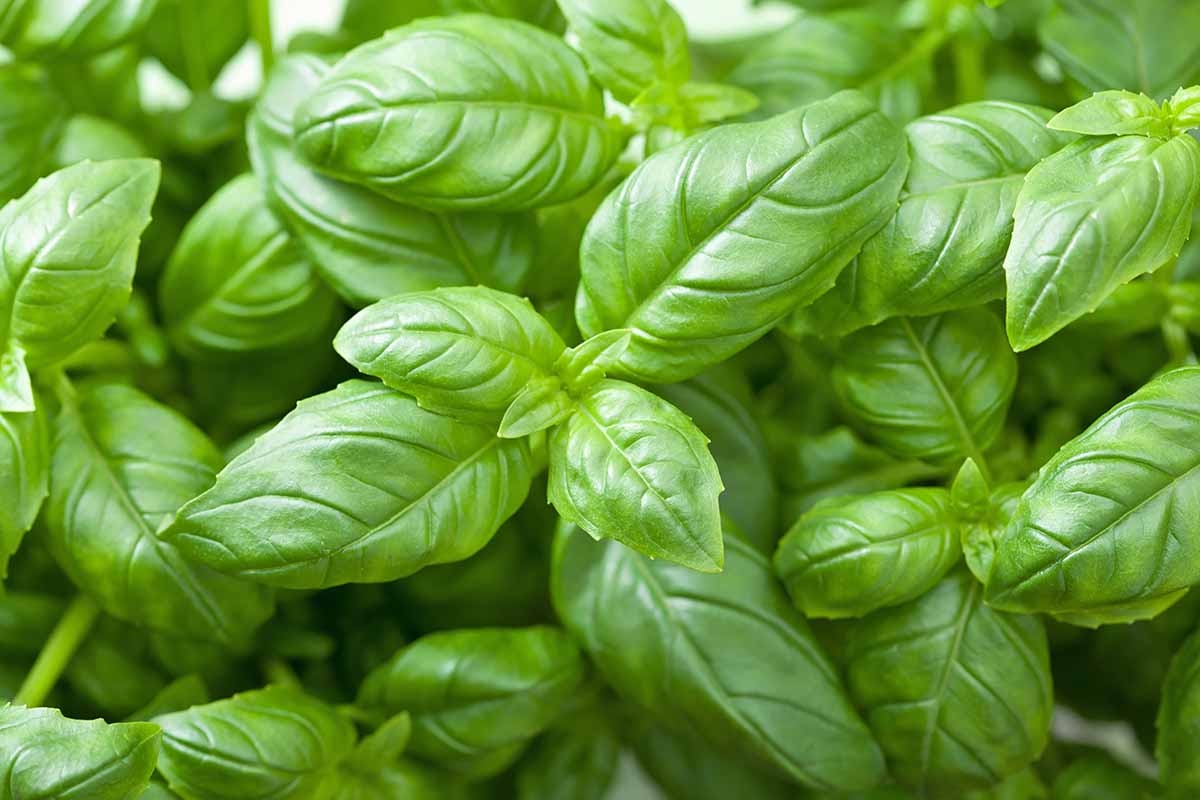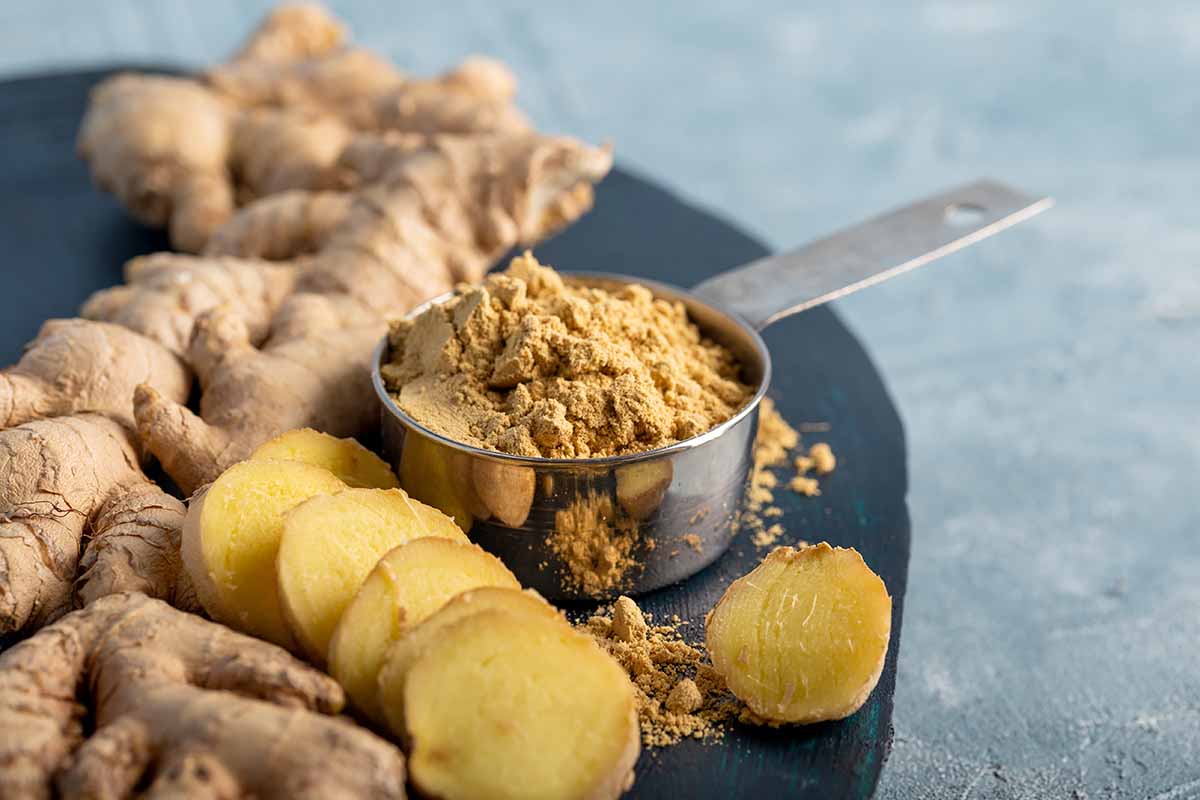Many herbs and spices offer potent healing powers and health benefits. However, many of the bottled spices found at the grocery store have been irradiated, not to mention that they have generally been hanging around on the shelf for quite awhile, which nullifies the health benefits (and, in many cases, the flavor and aroma).

To enjoy the health benefits of herbs and spices, it is best to either grow them at home, or buy them organic and fresh from a natural grocery store or farmers market.
Herbs and spices are a healthier alternative for flavoring food than salt. Refined (“table”) salt may make individuals more prone to high blood pressure, kidney problems, and heart disease.
It can accumulate in body’s tissues, potentially damaging kidney fibers and arteries, hardening the urinary tract, and promoting headaches, pain and tightness. If salt must be used, try mineral-rich sea salt or kelp instead.
Fresh herbs make a delicious addition to many of your favorite recipes, like steamed garden vegetables. You can also use them to flavor drinks like iced tea.
Love to mix your herbs? Try a fun combo of fresh ones like basil, rosemary, thyme, oregano, and parsley in our Sicilian pasta salad!
Or, try making a fermented drinking vinegar at home, with herbs and fresh fruit.
Ginger
The medicinal use of ginger dates back to ancient times, according to early medical texts in India, China, Greece, Rome and the Middle East. Traditionally, ginger is used for treating flatulent colic and indigestion.
Ginger may be used as a natural treatment for dyspepsia, and a motion sickness preventative.
It’s also known for its beneficial properties in the treatment of morning sickness during pregnancy, for stimulating the appetite, and as a treatment for bronchitis and rheumatic discomforts.
In clinical trials, ginger was found effective for the prevention of seasickness, morning sickness, and chemotherapy-induced nausea.
Onion
Onion is beneficial for maintaining healthy cholesterol levels, lowering blood clot risk, and cleansing the blood and lungs.
Parsley
Parsley has a mild flavor that is good for use in soups, stews, and salads, and it make a bright, pretty a garnish (just remember to eat it, rather than leaving it on your plate!).
Bright green parsley, which is a rich source of chlorophyll, is recommended as a powerful breath freshener.
Medicinally, it is good for indigestion as well as treating ailments of the lungs, liver and spleen, and it may help to fight infections of the kidneys, bladder, and urinary tract.
This herb is a superior medicinal food, containing high levels of fiber, carotenoids, vitamin C, folate, and other antioxidants.
The leaves and stems also contain generous amounts of calcium and boron, helpful for preventing osteoporosis. Parsley also contains substances similar to those found in broccoli that may act as a cancer preventative.
Click here to read our full report on parsley or find a complete growing guide over on our sister site, Gardener’s Path.
Rosemary
Rosemary is from the mint family and it is often used to flavor stews, potatoes, soups, vegetables, and lamb dishes. It also makes a delicious flavored olive oil. And it has a preservative effect when mixed with food that spoils easily.
Medicinally, it helps to prevent food poisoning, fight infection, and ward off headaches.
According to Dr. James Duke, author of “The Green Pharmacy,” rosemary leaf contains dozens of powerful antioxidant compounds, and several compounds that prevent the breakdown of acetylcholine in the brain, which may be beneficial for those with Alzheimer’s disease.
Rosemary is also recommended for preventing and fighting cataracts, as the herb is known to contain at least four anti-cataract compounds.
The antioxidant benefits of rosemary may also improve vascular disorders, and this can be obtained by regularly drinking rosemary tea, or using generous amounts of the fresh herb in cooking. Read more about rosemary.
Sage
Sage has a warm, bitter flavor that pairs well with salads, pickles, and cheeses, as well as various types of meat, particularly turkey. Medicinally, it is good for alleviating canker sores, bleeding gums, sore throats, and lung ailments. Sage contains active volatile oils, tannins, and resin.
Sage leaves also contain ursolic acid, which has antibiotic properties. Herbalists sometimes use sage to treat tonsillitis, mouth ulcers, and throat problems, and a tincture of the herb may be used as a gargle.
Thyme
One teaspoon of thyme in one cup of water, sweetened with one tablespoon of honey and taken three to four times daily, is said to be good for helping to treat infectious bronchitis, and diarrhea. Read more about cooking with this extraordinary herb.
Turmeric
Turmeric belongs to the same plant family as ginger, and was commonly used in traditional Oriental remedies as a stomach tonic and blood purifier. Turmeric has been used to treat digestive disorders, cardiovascular conditions, and certain cancers.
In addition, the turmeric plant contains numerous volatile oils known to exhibit strong antibiotic properties. For this reason, turmeric is often used topically for certain skin conditions and minor injuries, as a means of preventing bacterial infection.
The active constituent in turmeric is curcumin, which offers the following medicinal and therapeutic properties:
- Acts as an anti-inflammatory by lowering histamine levels, offering relief of arthritis pain
- Acts as an antioxidant, protecting the liver from certain toxins
- Promotes healthy circulation by inhibiting blood platelets from sticking together
- Induces the flow of bile, which breaks down fats
Note: Individuals with stomach or gallbladder conditions should not take turmeric in supplement form. Pregnant women should also avoid taking large amounts, as it may pose a risk of miscarriage. Supplemental use is not recommended while breast feeding. Always seek the advice of a medical professional prior to using any form of supplements.
Find more about growing your own herb garden over on Gardener’s Path.
Sources
- Prescription for Dietary Wellness; Phyllis A. Balch, CNC and James F. Balch, M.D.; 1998.
- Anti-aging Manual: The Encyclopedia of Natural Health (3rd ed.); Joseph B. Marion; 2005.
- The Green Pharmacy: Herbal Remedies for Common Diseases and Conditions from the World’s Foremost Authority on Healing Herbs; James A. Duke, Ph.D.; 2003.
The staff at Foodal are not medical professionals and this article should not be construed as medical advice. Foodal and Ask the Experts, LLC assume no liability for the use or misuse of the material presented above. Always consult with a medical professional before changing your diet or using supplements or manufactured or natural medications.
About Lynne Jaques
Lynne is a stay-at-home mother of two boys. As a former US military officer and the spouse of an active duty US military member, Lynne enjoys traveling the world (although not the moving part!) and finding new cuisine and methods of preparing food. She also has the habit of using parenthesis way too much!




I use ginger a lot in juicing. It really gives the juices a little kick, and the health benefits are really exceptional. I had no idea that parsley had so many health benefits. I am going to start using it more in my salads and salsas.
I’ve read a lot about adding ginger into different juices. I have a jucier but I have’t used it much yet. That’s the only thing I’ve ever seen ginger added to (except for ginger ale I suppose).
I’m an onion fanatic. I can just snack on onions but my boyfriend told me that is really weird. I didn’t realize they had so many benefits. I might have to start snaking on onion slices agin. I already use parsley in many different things, but I might have to start using thyme. Thanks for the article.
Back in high school, i loved taking rosemary in my tea, it was amazing, the minty smell and taste…quite nostalgic. Its hard to find it nowadays, severally i have found myself begging the grocer to bring but i always assume he has forgotten or it costs an arm and a leg hence why its never stocked on the shelf, i won’t lose hope, i ‘ll keep on looking or better yet, plant my own{buy the seeds}.
I h ave a mini herb garden of my own, it is in a small plastic house in the garden and really easy to maintain. I grow Ginger, Sage and Mint at the moment. If you write another post Lynne may I suggest you add mint? It is a useful, versatile herb, easy to grow and offers a lot of possibilities when cooking, I am sure you will agree.
Great post as always, very informative. I didn’t realize all the health benefits involved.
Yes! Mint is amazing! I do some freelance writing and just wrote an article about mint the other day and was super excited about all the health benefits it has, and there are so many varieties, too! I have both spearmint and peppermint growing out on my balcony, and they’re so easy to grow. I have 13 mint plants that started from one plant which I took cuttings from and eventually had to go in and split apart because it was root-bound in its pot, and I have 11 cuttings started from my 1 peppermint plant that I took from just one runner… I’ve also got a dozen basil cuttings that have rooted from my one basil plant.
But after reading this, I feel like I definitely need to add to my garden. The nursery where I bought the peppermint and basil had thyme, but I passed it up because I didn’t know what I would use it for, but now I know! 😀
As of now, ginger is the most helpful plant listed above on me. It helps me relieve my nausea and vomiting in my pregnancy period. Also, according to my mom, its also good in detoxification as it promotes sweating which is helpful during flu and colds. I have no choice though it tastes hot! So to enjoy it, I sometimes add honey.
That’s all very interesting, but I disagree with the claim about salt. All salts can lead to damage because of the content of sodium. The one natural bonus of sea salt is that it contains iodine in its natural form; in table salt, it is added, to prevent goiter. Of course, we have too much salt in our diets and herbs and spices are a great way to bring taste while not bringing hypertension — I can just remember my granny who has nothing but salt and pepper shakers to season her food… but really, unless you have some interesting studies I did not see, it won’t matter much that you use table salt or sea salt.
I do know many people who think the added fluoride in some salts is trouble waiting to happen, though.
I think the idea is that if you are going to have a bit of salt, use a more natural form. It is tough to completely eliminate all sodium from our diet, especially when cooking for people who are used to that taste. I would look add other spices such as garlic or chilli flakes to add a bit more flavour to the salt sprinkler.
I picked up the habit of drying my own herbs as a teenager thanks to my grandmother. It’s great since you don’t have to keep a lot growing to manage and it’s way cheaper than buying them. Plus when I find an interesting recipe and I’ve been good at managing the stockpiles I’ve got it and I don’t need to run to the store.
However I’m not sure if dried herbs have the same nutritional benefits as fresh ones do.
I have a question about herbs that maybe someone can answer. I grow my herbs indoors, basil (for as long as it lasts), parsley, sage and chives mostly. But lately most of the plants are a bit older even though they are always pruned and re-growing. I swear they are all (other than the chives) getting more and more bitter tasting.
Do I need to throw them out and start again? Or can I fix this by something like re-potting? Or is it just seasonal and something to do with summer, or not watering enough? I swear the parsley especially has developed a very unappealing acrid after-taste! But the sage also seems to have a similar thing happening, but less pronounced.
Herbs can get bitter when they go to seed. Have some of your plants developed really long fast growing stems in the middle, with flower buds on top? Once that happens, the plant takes effort away from producing tasty leaves and puts all its energy into producing flowers and seeds instead. If that’s the case, you’ll need to start raising new plants.
Growing herbs is one of the best thing you can do! When I was little I had a pretty big garden and I thought I’ll never be able to have homemade herbs when I’ll move to my own apartment, but now I grow them on my balcony and they’re doing great!
Thank you for this post! Most people tend to rely on the use of prescription medicine in modern times, but don’t see the benefits of using different herbs they can grow at home. I hope that this post introduces people to different ways to treat more common sicknesses.
I love fresh herbs! I buy them whenever I can, I much prefer to use fresh rather than dried. I also just started my own herb garden
I had no idea that ginger is used in treating anorexia… That’s incredible! I guess I should steer clear of it, since my appetite is too big already. I’m always amazed when something as inconspicuous as a herb can help fight cancer or other terrible diseases. I find it so touching how nature helps humans. We need to be more considerate of Earth.
This is good to know, Lynne. Thanks for informing us! Wish I was better at keeping my own fresh supply of herbs, but maybe that’s something I’ll put more effort into this new year. 😉
Most herbs lose their taste once they stay for long. I have personally experimented this with coriander. Refrigerating them for long also makes them tasteless and lose nutrients. I’m glad this article has talked a lot about the benefits of fresh herbs.
I am a big fan of fresh herbs, I love to walk in the garden and pick the herbs I need for today’s dish. My favorite herb must be rosemary. It’s great to know that the herbs I love to cook with are actually very good for my health, I will start drinking more thyme and ginger tea.
Woah… I knew herbs were good but I never thought it would be this good. This article makes me want to grow a herb garden… Although I do wonder if I can -it might be too hard for a beginner like me :3 Hoho.
Although I know onions has its benefits, I just don’t like them. Unless I’m able to diguise the taste of onion I might not eat it. I didn’t know that rosemary comes from the mint plant family. I have peppermint teas that I have been making for myself. I have had ginger candy in the past and it was tasty. I would like to have it as a tea.
On most occasions I try to use fresh herbs vs dry herbs. However, dry herbs are more readily available and they last longer than fresh herbs. That being said, I do realize the difference in flavor when I don’t use fresh herbs.
I really should just start growing my own herbs and spices to minimize cost and maximize flavor. I love ginger and use it mostly in stir fry and as a tea when feeling bloating. As for onions and garlic, what can I say, I use these in 90% of my cooking….a staple in my pantry.
As a vegetable gardener, having herbs tucked away in little areas of the garden is very aromatically pleasing. Garlic, basil, lemon balm and mint can regularly be found in my garden. Parsley, Rosemary, and Thyme are some herbs that I’ve been considering for a while to add to my garden, I’ve known a lot about all threes medicinal uses and I want to use them for medicinal usage as well as cooking with them.
Lately I’ve been using ginger a lot more too, and I’ve also thought about growing a little ginger too. Do you know if ginger is easy to grow or how long it takes to grow ginger? Many people say growing ginger is easy and it probably is, but do you think it’s really worth growing in a home garden?
I absolutely love fresh herbs and always try to sprout them at home, or buying them in stores and using them in every day cooking.
A simple pasta dish with just basil and olive oil is the best in the world.
and you cannot discount the mental health aspects of working in a garden! Even just a small herb garden that you spend a couple hours a week in can give you a lot of relaxation. I have oregano, basil, rosemary and cilantro in my garden and I also grow jalapeno peppers in the same area. For me there are health benefits obviously, but the bigger part of it is just never having to worry about buying (or forgetting) the small stuff that goes into meals.
Thank you for sharing! Its always good to know these facts, A few years ago my dad used to have a kind of a big garden outside our house, he used to plant a lot of different things there, I don’t exactly remember how they were called, but there were a lot of medicinal herbs there, and when we got sick we used to know exactly what to give to us and we got better almost instantly. In my opinion, I think that’s better to really know what you’re eating, and what a better way to do it planting your own things?
Well I have always known that there were certain health benefits to using fresh herbs, but have never really had it put in a nice short list, so for that I have to say thank you. I was particularly excited to see that rosemary is good for vascular issues, because it happens to be one of my favorite herbs to use in tn the kitchen, and also a health issue that I am struggling with, so that works perfectly for me. Thanks for sharing.
If ginger made the list I think garlic deserves a spot too! Although that’s an article on all its own I’m sure 🙂 Love the advice about using more herbs to replace salt – the tricky part is that because we evolved in such a sodium-poor environment, we are physically designed to crave salt; but when it’s added to almost literally every single processed food item, it becomes a big problem, and it’s hard to deny your body’s perfectly natural craving for it. But clever use of herbs and spices, especially ginger and garlic, are a superb way to add flavor while minimizing salt. Great article.